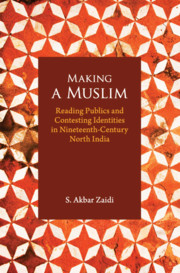4 - Performativity, and Orality in Print
Published online by Cambridge University Press: 24 March 2021
Summary
Many historians now believe, perhaps rather perversely, that what happened in the past is less important than what people thought had happened…. [Historians] are aware that many so-called ‘facts’ are contestable and that events look different to different observers.
—Keith Thomas, ‘History Revisited’, Times Literary Supplement, 11 October 2006Oral performances are precisely that, a performative act. Whether it is a recital, a mushā‘ara, a munāzara, even a speech (taqrīr) or a lecture, as long as these are events where there is a public, meant for a public, they are bound to be performed in front of a public: some gallantly, for affect, some subdued. In the age of print, scholars often overlook not just the impact and affect of oral mediums—which, as many of the examples here suggest, have a very different impact compared to the written word—and often oral performances are seen only in their print form. Yet there are numerous first-person accounts, an ānkhon dekhā hāl or a rū’e-dād, which allow us to ‘see’ the performativity of the presentation as well as examine the more (perhaps) scholarly or intellectual product, eventually available in print. Yet such an over-emphasis on the print medium takes away much of the emotive or moralising intonation—the performance, for affect—in what was being said, where and to whom. Moreover, an oral performance is not just one or a group of individuals performing in front of many others. They come with a huge paraphernalia and logic that is different from the practice and discipline of writing. As I show and as many of the accounts here also suggest, oral performances were, according to written accounts, mesmerising, enthralling, captivating, having a strong emotive and often sensational content and impact on the audience present. There was an adā and an andāz (grace and style) to such practices, even the intricate details of where the sham‘a (lamp) was to be placed at an imagined mushā‘ara became a case of contestation, in which decorum was of the utmost significance. It was the andāz-i bayān (style of presentation) that distinguished poets as much as the content and meanings of their verses; the vah-vah (verbal laudation) of the appreciative audience was often about how a poem was recited as what was being recited.
- Type
- Chapter
- Information
- Making a MuslimReading Publics and Contesting Identities in Nineteenth-Century North India, pp. 171 - 208Publisher: Cambridge University PressPrint publication year: 2021



